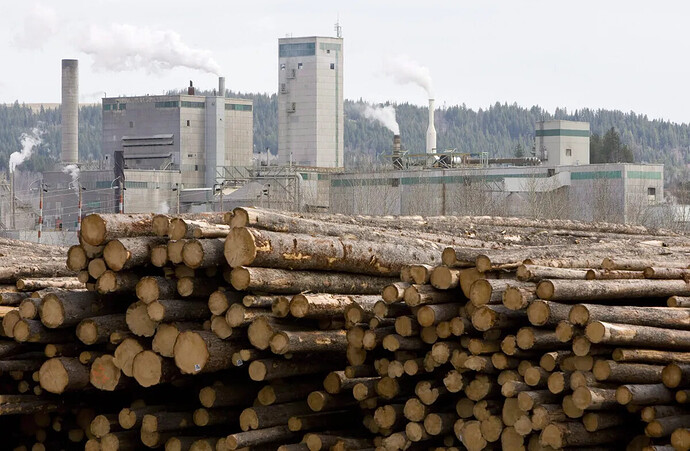Ottawa should appoint a special envoy to mediate a truce in its protracted trade battle with the United States over softwood exports, the chief executive officers of seven major lumber producers in Canada say.
In a March 10 letter sent by the CEOs to International Trade Minister Mary Ng, they say an ideal candidate for the envoy position would be David MacNaughton, a former Canadian ambassador to the U.S.
“David has the right institutional knowledge, is current on the file and enjoys well-deserved respect and admiration on both sides of the border,” the executives add in the letter, which was obtained by The Globe and Mail.
The letter summarizes key points from an online discussion that six of the CEOs had held the previous day with Ms. Ng on the softwood dispute. They are also urging the Canadian government to place the softwood file on the agenda for a March 23-24 summit in Ottawa between Prime Minister Justin Trudeau and U.S. President Joe Biden.
“We respectfully submit that the upcoming Trudeau/Biden summit is an ideal opportunity for the leaders of both countries to address this issue, to underscore its importance to the North American economy and to publicly set a realistic time frame for an amicable resolution,” they say in the letter.
In an interview, Mr. MacNaughton said he has been approached by Canada’s lumber industry to represent the country on softwood, with the expectation that the U.S. would then agree to appoint its own special envoy. “If drafted, I would be prepared to serve,” he said.
Mr. MacNaughton said reaching a negotiated settlement is possible if there is political momentum generated from the Ottawa summit. “It’s an occasion where you can try to resolve issues that are outstanding,” he said.
The lumber CEOs who signed the letter are the leaders of West Fraser Timber Co. Ltd.
WFG-T +1.79%increase
, Canfor Corp.
CFP-T +3.02%increase
, Resolute Forest Products Inc.
RFP-T -5.76%decrease
, Interfor Corp.
IFP-T +3.32%increase
, Tolko Industries Ltd., J.D. Irving Ltd. and Western Forest Products Inc
WEF-T -1.80%decrease
.
The letter says they are open to the idea of Ottawa appointing Mr. MacNaughton as a joint emissary with a Canadian industry representative, who would work with him to attain softwood peace. “It is imperative that the emissaries be government-appointed in order to avoid antitrust and competition concerns,” the CEOs write.
Mr. MacNaughton stepped down as Canada’s ambassador to the U.S. in August, 2019, after serving for more than three years.
Even if Mr. Trudeau and Mr. Biden agree that the two countries need to begin talks to resolve this latest round of the softwood fight, any formal agreement would likely take several months to come to fruition.
A 2006 Canada-U.S. softwood agreement expired in 2015, with no replacement. In the latest phase of the long-running trade fight, the U.S. Department of Commerce started imposing tariffs on Canadian lumber in 2017.
Global Affairs Canada, which said Ms. Ng was not available for an interview on Wednesday, issued a statement saying she and Mr. Trudeau have raised the softwood issue with the U.S. in the past and will continue to do so.
“It is the U.S. who is not meeting us at the table,” Global Affairs spokesperson Jason Kung said. “Canada will take every opportunity to defend its softwood lumber industry and raise our willingness to explore all avenues to resolve the dispute.”
The dispute revolves around U.S. restrictions on Canadian exports of softwood to American buyers. The U.S. says the measures are necessary to protect its lumber industry, because Canadian forests are mostly on public land, where buyers pay “stumpage fees” to provincial governments for the right to log. The U.S. argues those fees can give Canadian loggers a competitive advantage over U.S. loggers, who harvest timber largely from private lands and bid against each other for the privilege.
Canada’s softwood producers say they have paid more than $8-billion in lumber duties to the U.S. from 2017 to 2022.
The U.S. Lumber Coalition defends the tariffs, saying strong enforcement of U.S. trade laws against “unfairly traded” softwood from Canada is crucial for American lumber manufacturers and timberland owners.
Lumber prices have tumbled more than 75 per cent after peaking in May, 2021, when a renovation craze helped drive up demand for wood products in the midst of the COVID-19 pandemic.
Sawmills in the British Columbia Interior are especially vulnerable to production cuts, which can happen when lumber prices fall below break-even levels, as they have in recent months.
Forest Economic Advisors, a consulting firm, estimates that U.S. sawmills accounted for 68 per cent of U.S. domestic consumption of lumber last year. The share of U.S. consumption satisfied by Canadian sawmills has steadily eroded, in part because of constraints on B.C.’s timber supply. It fell to 26 per cent last year, compared with nearly 33 per cent in 2016.
The remaining 6 per cent of U.S. market share last year was held primarily by European producers, which do not pay U.S. lumber duties.
The latest clash over softwood is known in the forestry industry as Lumber V, because it is the fifth round in the extended battle.
“We are now in the fifth iteration of the softwood lumber dispute since 1982,” the CEOs say in their letter. “History teaches us that the softwood lumber dispute is only resolved when the Canadian government insists it be addressed and makes it a priority in dealings with the U.S. government.”
Canada enjoyed a short-lived victory 40 years ago, in what began as a spat between friends. In March, 1983, the U.S. International Trade Administration (ITA) disagreed with the U.S. lumber lobby’s argument that provinces unfairly subsidized domestic producers. But by 1986, the ITA had changed its mind and sided with the U.S. lumber industry.
